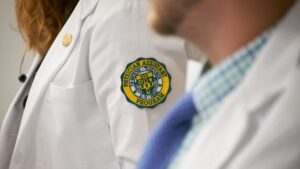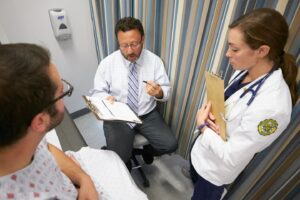Information for Preceptors

Welcome! Preceptors play a pivotal role in educating students in Le Moyne’s Physician Assistant Studies program. Not only do they guide and mentor students as they gain hands-on, real-world clinical experience, but they also model what it means to be a compassionate and caring health care provider. The preceptor imparts medical knowledge, helps the student refine clinical skills and serves as a clinical role model. We thank you for your interest in becoming a preceptor and hope that you will find the information and resources available here helpful.
Becoming a Preceptor
Eligibility
We're looking for MD, DO, NP, PA, CNM professionals who are board/NCCPA Certified and are licensed and in good standing with your state licensing board. We need preceptors who are willing to assist students in meeting their learning objectives for each rotation.
Rotation Information
Most rotations are five weeks in duration, 36 hrs/week. If you would prefer placements in 2 or 3-week blocks, please contact the Clinical Coordinator. Rotations include Family Medicine, Women’s Health, Pediatrics, Emergency Medicine, Internal Medicine, General Surgery, Behavioral & Mental Health, Elective.
Forms You'll Need
Rotation Dates for Clinical Year 2025-26
- 03/17/25 – 04/17/25
- 04/28/25 – 05/29/25
- 06/02/25 – 07/03/25
- 07/14/25 – 08/07/25
- 8/25 – 9/25/2025
- 09/29/25 – 10/30/25
- 11/03/25 – 12/04/25
- 01/05/26 – 02/05/26
- 02/09/26 – 03/12/26
- 03/16/26 – 04/16/26
- 04/27/26 – 05/28/26
- 06/01/26 – 07/02/26
- 07/13/26 – 08/06/26
Frequently Asked Questions
You are eligible to serve as a preceptor if you are:
- An NCCPA-certified Physician Assistant (PA), a board-certified medical doctor (MD), a board-certified doctor of osteopathy (DO), a nurse practitioner (NP), or a certified nurse midwife (CNM)
- Are licensed and in good standing with your state licensing board
- Willing to assist students in meeting their learning objectives for the rotation
Financial
- We offer a $100/week stipend for student placement. It is up to the facility or organization to determine how this funding is distributed.
- Preceptors who do not accept honorarium have the option to donate back to scholarship fund for Le Moyne PA students
Practical
- Opportunity to stay up-to-date on latest medical knowledge and trends in medicine
- Recruit new PAs to your practice
- Preceptor locations have access to Handshake, a job recruitment site used by Le Moyne College students and over 2,000 colleges, universities, and community colleges.
- Possibility to earn CME depending on your affiliation
- Free training modules for preceptor development
- Address the workforce shortage in healthcare
- Demonstrate leadership ability and teaching skills within your organization
- An energized practice environment – students bring new energy and are excited to perform tasks that may be mundane to you and your colleagues
- Invitation to free programs to support preceptor development and engagement
- In the 2022-23 clinical year, we offered the following programs & events: The Resilient Physician Assistant lecture by Dr. Robert Wicks, Alumni & Preceptor Social at NYSSPA, PAs Living the Mission Webinar, Open Classroom on Food Insecurity and Health, PA Networking Night, Tending the Flame Retreat, in addition to continued offering of free modules for ongoing learning on Addressing Adverse Childhood Experiences, Building a Culture of Wellness, Caring for Rural and Underserved Communities, Implicit Bias Applications for Healthcare Professionals, and Opioid Use Disorder.
Intangible
- Participate in the development of the next generation of medical professionals
- Give back to the community and help build the profession
- Expand your professional network
Students are expected to work 36/week throughout the duration of their rotation. If you are unable to provide the minimum number of hours, please contact Katie Compagni, our clinical coordinator to discuss options
No, additional licensed practitioners can provide supervision on days you are unavailable. Time spent with other licensed healthcare professionals enriches the student experience and models interprofessional patient-centered care.
Le Moyne College maintains standard liability insurance in an amount not less than $1 million to $3 million per occurrence
During the first year of Le Moyne’s physician assistant studies program, students develop their clinical thinking skills. Students will be able to:
- Interview the patient and obtain medical history
- Perform the appropriate physical examination
- Perform various procedures
- Present his or her findings to the preceptor
- Formulate an assessment with substantial input and teaching from the preceptor
- Decide on a plan of therapy that integrates the student’s level of knowledge with the preceptor’s clinical experience
- Apply evidence-based medicine to patient care
- Document or dictate appropriate notes to be reviewed and countersigned by the preceptor
If you identify a student that is struggling, the sooner you let us know, the sooner we can assist them and provide the needed support. Please communicate any concerns to Katie Compagni, MPAS, PA-C at compagkh@lemoyne.edu or 315-445-4701 or the course instructor. In addition, it can be helpful to address concerns directly with a student and work with them to develop a plan moving forward. We are available to support you with this process.
Le Moyne is one of only a handful of PA programs that presents medical humanities courses as integral to training. In conjunction with evidence-based medicine skill acquisition, self-directed learning and resource utilization, the Le Moyne graduate learns to care for the whole person. Community service learning moves the student from the classroom to the neighborhoods to facilitate an even greater, deeper understanding of the human condition.
The Le Moyne PA program has also been the recipient of a number of grants that have allowed us to enhance our curriculum and develop ways to further prepare our students for work in a variety of settings.
Clinical rotation syllabi are available via Exxat.
Teaching Resources:
- One Minute Preceptor
- How the Best Clinical Educators Provide Student Feedback
- Giving feedback to students
- Introducing/Orienting a PA Student to your Practice
- Incorporating Students into a Patient Care/ Workflow
- Article: A Bonus, Not a Burden: How Medical Students Can Add Value to Your Practice
- Article: How to Be an Efficient and Effective Preceptor
- How Students Can Add Value to Your Office
Additional Resources:
- Getting started with Handshake
- Le Moyne College Physician Assistant Course Catalog
- Clinical Year Syllabi and other Clinical Year Resources
- Addressing Health Worker Burnout
- AAPA Clinical Preceptor Recognition Program
- PA Foundation
- Competencies for the PA Profession
- Preceptor Quick Facts
- Le Moyne College Curriculum and the Role of the Preceptor
- Sample Affiliation Agreement
Preceptor Development Toolkit
These modules were developed with funding from a HRSA Primary Care Training and Enhancement Grant. All preceptors are welcome to complete these modules.
All modules are available at toolkit.pas.lemoyne.edu. If you previously completed any modules using our former learning management system, we have transferred your registration and module completion history to this platform. You will need to click the “Lost your password?” link to set a new password. For technical assistance, please contact HWapps at support@hwapps.org.
- Empower you to create a dynamic learning environment for future healthcare providers.
- Explore how to evaluate students and ensure their competencies.
- Define your roles and responsibilities and understand the role of the PA students and the Le Moyne College PA Program.
- Summarize the benefits of having a PA student at your clinical site.
- Define Adverse Childhood Experiences (ACEs) and identify common ACEs
- Describe the lasting impact of ACEs on both the mental and physical health of individuals
- Integrate Screening, Brief Intervention, and Referral to Treatment (SBIRT) into your clinical practice as an approach for patients with substance-use disorders
- Understand various strategies for ACE prevention and the value of this practice on a personal and community level
- Define wellness and burnout
- Understand the fundamentals of an organizational wellness program
- Assess wellness and prevent burnout in their organization
- Identify the benefits of having a wellness program
- Define the Social Determinants of Health (SDH) by 1) understanding what affects patient access to quality healthcare and 2) listing the barriers to healthcare, including health literacy
- Assess SDH, health literacy, and patient readiness for change in the clinical setting
- Address SDH and population health in a welcoming clinical environment by 1) identifying community resources for vulnerable populations and 2) developing a comprehensive healthcare team in order to effectively coordinate care
- Describe the role of various medications in the treatment of OUD in conjunction with the importance of individualized behavioral counseling
- Discuss three sets of statistics regarding deaths in America as a result of opioid use disorders, with or without concomitant use of other psychoactive substances
- Explain how naloxone (eg, NARCAN, EVZIO) works, plus how and under what circumstances it can be delivered in cases of opioid overdose
- Discuss the biopsychosocial spiritual aspects of caring for a patient experiencing Food Insecurity
- Define Food Insecurity and Health Literacy
- Describe the impact of Food Insecurity on health
- Describe why knowledge on Food Insecurity is essential to healthcare providers providing adequate care
- Identify and describe the primary risk factors for Food Insecurity, including economic, social, cultural, and environmental factors.
Educate tomorrow's healers and promote Healthcare Equity by supporting students to live the Le Moyne mission in their professional careers to move the dial on health equity.
Get in Touch
- Colleen Bullock, MS, Grant Project Manager
- Katie Compagni, MPAS, PA-C, Clinical Coordinator
- Ariel Placeres, AAS, Clinical Placement Specialist
- Elizabeth Mercer, MPAS, PA-C, Program Director





